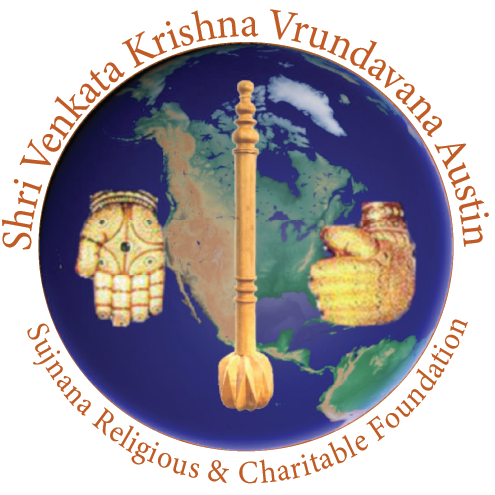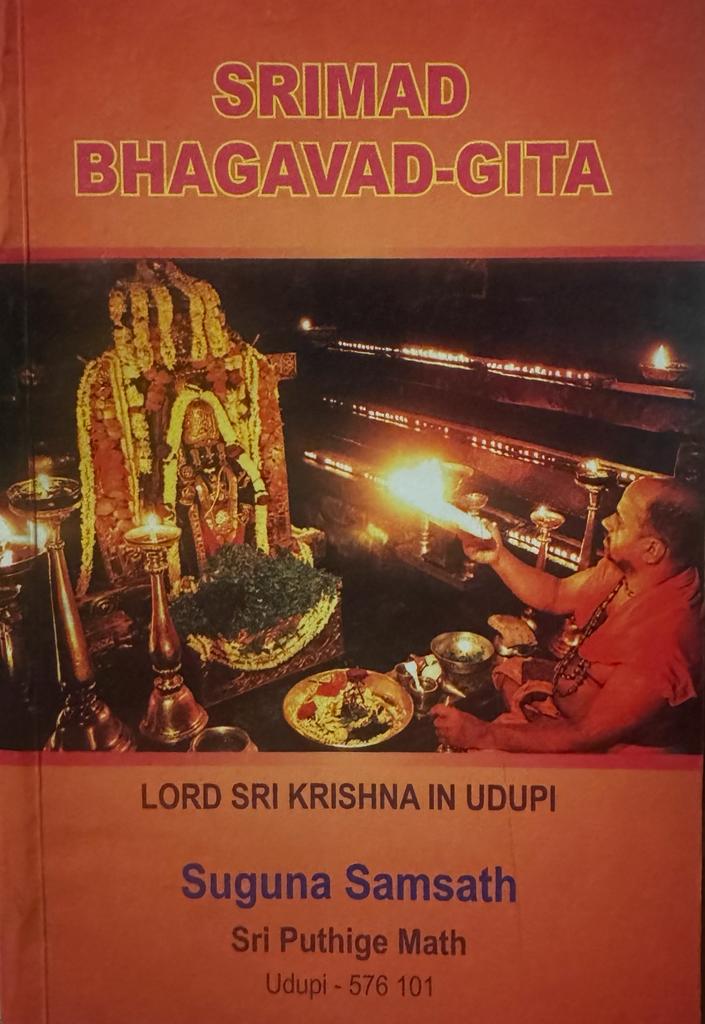हरि सर्वोत्तम । वायु जीवोत्तम । श्री गुरुभ्यो नमः ।
*NOTE: Choose desired output script using Aksharamukha (screen top-right) to see Vedaswara.

Bhagavad Gita 8: Akṣarabrahma Yoga
हरि सर्वोत्तम । वायु जीवोत्तम । श्री गुरुभ्यो नमः ।
अथ अष्टमोऽध्यायः
अक्षरब्रह्मयोग
अर्जुन उवाच
किं तद् ब्रह्म किमध्यात्मं किं कर्म पुरुषोत्तम ।
अधिभूतं च किं प्रोक्तमधिदैवं किमुच्यते ॥ ८।१ ॥
अधियज्ञः कथं कोऽत्र देहेऽस्मिन्मधुसूदन ।
प्रयाणकाले च कथं ज्ञेयोऽसि नियतात्मभिः ॥ ८।२ ॥
Arjuna said –
Brahman, what is the Adhyātma and what is Karma? What is described to be Adhibhūta and what is spoken of as Adhidaiva? O Madhusūdana, is this body who is Adhiyajña and how? And how at the time of departing i.e., death, are You to be known by those who have controlled their mind?
श्रीभगवानुवाच
अक्षरं ब्रह्म परमं स्वभावोऽध्यात्ममुच्यते ।
भूतभावोद्भवकरो विसर्गः कर्मसंज्ञितः ॥ ८।३ ॥
Śrī Bhagavān said –
Brahman is the Supreme Akṣara (the highest among the imperishables). Adhyātma is what is attached to the Jīvā viz. body, organs of sense and mind Svabhāva means that which helps the Jīvā such as body, organs, etc.) Karma constitutes the act of creation by the Lord of Bhūta and Bhāvana i.e., Jīvā-s and inanimate matter.
अधिभूतं क्षरो भावः पुरुषश्चाधिदैवतम् ।
अधियज्ञोऽहमेवात्र देहे देहभृतां वर ॥ ८।४ ॥
O the best of living beings, Adhibhūta is the perishable matter which is the adjunct and the vehicle of the embodied soul; Ādhidaivata is Puruṣa, i.e. Sankarṣaṇa who is the presiding deity over all Jīvas. In this body attached to Jīvās it is only I who am called Adhiyajña – as I am the Energiser and Enjoyer of all Yajñas.
अन्तकाले च मामेव स्मरन्मुक्त्वा कलेवरम् ।
यः प्रयाति स मद्भावं याति नास्त्यत्र संशयः ॥ ८।५ ॥
Whoever at the time of death shuffles off his body and departs thinking of Me alone, attains the state of being in Me. There is no doubt about this.
यं यं वापि स्मरन्भावं त्यजत्यन्ते कलेवरम् ।
तं तमेवैति कौन्तेय सदा तद्भावभावितः ॥ ८।६ ॥
O Kunti’s son, whatever object a dying man thinks of at the time of leaving his body, he goes to or attains that object on account of persistent thought of that particular thing only.
तस्मात्सर्वेषु कालेषु मामनुस्मर युध्य च ।
मय्यर्पितमनोबुद्धिर्मामेवैष्यस्यसंशयः ॥ ८।७ ॥
Therefore, at all times think of Me and fight. Having set your mind and heart on Me, you will doubtless come to Me.
अभ्यासयोगयुक्तेन चेतसा नान्यगामिना ।
परमं पुरुषं दिव्यं याति पार्थानुचिन्तयन् ॥ ८।८ ॥
O Pārtha, with the mind accustomed to constant practice, not wandering away from God and after other things, he (i.e. devotee) who instantly meditates on the Supreme Divine Puruṣa goes to Him.
कविं पुराणमनुशासितार-
मणोरणीयंसमनुस्मरेद्यः ।
सर्वस्य धातारमचिन्त्यरूप-
मादित्यवर्णं तमसः परस्तात् ॥ ८।९ ॥
प्रयाणकाले मनसाऽचलेन
भक्त्या युक्तो योगबलेन चैव ।
भ्रुवोर्मध्ये प्राणमावेश्य सम्यक्
स तं परं पुरुषमुपैति दिव्यम् ॥ ८।१० ॥
He, who at the time of death meditates with a steady mind and devotion, having focused Praṇa (life-breath) between the eye-brows, on that Exalted Person, Omniscient, Ancient, Ruler of all, Minutest of the minute, Supporter of all, having form which is incomprehensible in full, Who is as bright as the Sun and beyond darkness Tamas, reaches the Supreme Divine Person.
यदक्षरं वेदविदो वदन्ति
विशन्ति यद्यतयो वीतरागाः ।
यदिच्छन्तो ब्रह्मचर्यं चरन्ति
तत्ते पदं सङ्ग्रहेण प्रवक्ष्ये ॥ ८।११ ॥
That, which those versed in the Vedas assert is indestructible; which ascetics who are free from passion enter and desiring which people practices Brahmacarya, that I now briefly declare to you.
सर्वद्वाराणि संयम्य मनो हृदि निरुध्य च ।
मूर्ध्न्याधायात्मनः प्राणमास्थितो योगधारणाम् ॥ ८।१२ ॥
ओमित्येकाक्षरं ब्रह्म व्याहरन्मामनुस्मरन् ।
यः प्रयाति त्यजन्देहं स याति परमां गतिम् ॥ ८।१३ ॥
He, who restraining all the sensory channels of the body with the mind concentrated on Nārayaṇa, his life-breath transfixed in the Brahma-randhra in the head and reciting the monosyllabic AUM constantly medidates on Me, while departing from his body, attains the highest goal.
अनन्यचेताः सततं यो मां स्मरति नित्यशः ।
तस्याहं सुलभः पार्थ नित्ययुक्तस्य योगिनः ॥ ८।१४ ॥
O Pārtha, he who constantly thinks of Me without thinking of anything else, such a yogi who always is engaged in meditating on Me easily reaches Me.
मामुपेत्य पुनर्जन्म दुःखालयमशाश्वतम् ।
नाप्नुवन्ति महात्मानः संसिद्धिं परमां गताः ॥ ८।१५ ॥
Those great souls that have attained final liberation Mokṣa having come to Me are freed from rebirth which is the seat of sorrow and transitoriness.
आब्रह्मभुवनाल्लोकाः पुनरावर्तिनोऽर्जुन ।
मामुपेत्य तु कौन्तेय पुनर्जन्म न विद्यते ॥ ८।१६ ॥
O Arjuna, all the worlds barring the seat of Brahma in Mount Meru, the Janaloka and beyond are subject to return to transmigratory life but he who reaches Me, O Kunti’s son has no re-birth in the lower regions.
सहस्रयुगपर्यन्तमहर्यद् ब्रह्मणो विदुः ।
रात्रिं युगसहस्रान्तां तेऽहोरात्रविदो जनाः ॥ ८।१७ ॥
Those who know that the day of Brahma is of many thousands of ages (Yugas) and that the night also a many thousands of ages long, are the knowers of real day and night.
Note : Lord Śṟi Kṛṣṇa here introduces himself as the Creator, Preserver and Destroyer of the Universe. The word Brahman accordingly is to be understood as referring to him.
अव्यक्ताद् व्यक्तयः सर्वाः प्रभवन्त्यहरागमे ।
रात्र्यागमे प्रलीयन्ते तत्रैवाव्यक्तसंज्ञके ॥ ८।१८ ॥
From the Unmanifest Brahman all the manifested spring forth at cosmic dawn; and at the time of cosmic night Pral̤aya they are withdrawn into the self same Unmanifest Brahman.
भूतग्रामः स एवायं भूत्वा भूत्वा प्रलीयते ।
रात्र्यागमेऽवशः पार्थ प्रभवत्यहरागमे ॥ ८।१९ ॥
This multitude of beings born again and again goes to dissolution under the power of the Lord, O Pārtha, at the coming of night and again comes into being at the time of day.
परस्तस्मात्तु भावोऽन्योऽव्यक्तोऽव्यक्तात्सनातनः ।
यः स सर्वेषु भूतेषु नश्यत्सु न विनश्यति ॥ ८।२० ॥
But the Supreme, the Unmanifest, is radically different from the manifested. He is eternal and does not perish when all beings perish.
अव्यक्तोऽक्षर इत्युक्तस्तमाहुः परमां गतिम् ।
यं प्राप्य न निवर्तन्ते तद्धाम परमं मम ॥ ८।२१ ॥
The Unmanifest is called imperishable Akṣara and is spoken of as the Supreme goal. Those who reach it return not and that is My Supreme nature.
पुरुषः स परः पार्थ भक्त्या लभ्यस्त्वनन्यया ।
यस्यान्तःस्थानि भूतानि येन सर्वमिदं ततम् ॥ ८।२२ ॥
O Pārtha, the Supreme Person in whom all beings abide and by whom all this world is pervaded, can be reached only by uswerving devotion.
यत्र काले त्वनावृत्तिमावृत्तिं चैव योगिनः ।
प्रयाता यान्ति तं कालं वक्ष्यामि भरतर्षभ ॥ ८।२३ ॥
O the foremost of the Bharatas, I shall tell you the time and manner wherein the Yogis going forth do not return and also that wherein going forth they return (and the deities presiding over that time).
अग्निर्ज्योतिरहः शुक्लः षण्मासा उत्तरायणम् ।
तत्र प्रयाता गच्छन्ति ब्रह्म ब्रह्मविदो जनाः ॥ ८।२४ ॥
Those Knowers of Brahman who at the time of leaving their physical bodies pass over the paths named by Agni, Jyoti (god of Light), the god of day-time, the god of bright half of a month Śukla Pakṣa during the six months of Uttarāyaṇa (presided over by their respective deities) go forth to Brahman.
धूमो रात्रिस्तथा कृष्णः षण्मासा दक्षिणायनम् ।
तत्र चान्द्रमसं ज्योतिर्योगी प्राप्य निवर्तते ॥ ८।२५ ॥
Those yogis who at their death proceed along regions presided over by the god of smoke, the god of night, the god of dark half of a month Kṛṣṇa Pakṣa, during the six months of Dakṣiṇāyana having reached the light of the Moon, return to this earth.
शुक्लकृष्णे गती ह्येते जगतः शाश्वते मते ।
एकया यात्यनावृत्तिमन्ययावर्तते पुनः ॥ ८।२६ ॥
The path of light and the path of darkness are the paths of the world of Jñāna yogis and Karma yogis respectively. These paths are eternal. By the first, the Brahmajñāni reaches the state from which there is no return; by the other the Karma yogi returns to earth.
नैते सृती पार्थ जानन्योगी मुह्यति कश्चन ।
तस्मात्सर्वेषु कालेषु योगयुक्तो भवार्जुन ॥ ८।२७ ॥
O Pārtha, the yogi who knows these paths does not become deluded. Therefore, O Arjuna, at all times practise with devotion to Lord, the Nivṛtta karma enjoined upon the Varṇa and Āśrama in which you are stationed.
वेदेषु यज्ञेषु तपःसु चैव
दानेषु यत्पुण्यफलं प्रदिष्टम् ।
अत्येति तत्सर्वमिदं विदित्वा
योगी परं स्थानमुपैति चाद्यम् ॥ ८।२८ ॥
Having known the nature and meaning of Adhyātma and other connected matters, the omnipotence of the Lord and the realisation of Brahman and the two paths, the yogi attains virtue which transcends the fruits secured by the study of Vedas, the performance of sacrifices, austerities and charities and attains Me, the supreme and eternal state – Mokṣa, the abode of the Lord.
ॐ तत्सदिति श्रीमद्भगवद्गीतासूपनिषत्सु
ब्रह्मविद्यायां योगशास्त्रे श्रीकृष्णार्जुनसंवादे
अक्षरब्रह्मयोगो नामाष्टमोऽध्यायः ॥ ८॥
Thus ends the Eighth Chapter of the Upanisads of the Bhagavad Gīta entitled “Akṣarabrahma Yoga”, the Yoga of the Indesctructible Supreme.
Reference: Srimad Bhagavad Gita pocket book published by Suguna Samsath with English translation by Shri Bannanje Govindacharya (Received with blessings from HH Shri Shri Sugunendra Tirtha Swamiji of Puttige Matha in Austin, TX, Nov 1997)
Transliterated by Krishna Rao Vijayanagar and Raghunath Rao
“Do your Best … and leave the Rest … “
॥ सर्वं श्री कृष्णार्पणं अस्तु ॥


